| Listing 1 - 10 of 22 | << page >> |
Sort by
|
Book
ISBN: 9786611978235 Year: 1989 Publisher: Oxford : Clarendon,
Abstract | Keywords | Export | Availability | Bookmark
 Loading...
Loading...Choose an application
- Reference Manager
- EndNote
- RefWorks (Direct export to RefWorks)
This volume contains a series of essays which aims to show how some of the tools of advanced economic theory can usefully contribute to an understanding of how institutions operate. In particular, such techniques can be applied to the study of institutions within poor agrarian economies.
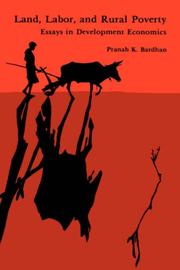
ISBN: 0231053886 0231053894 9780231053891 9780231053884 Year: 1984 Publisher: New York, N.Y. Oxford University Press
Abstract | Keywords | Export | Availability | Bookmark
 Loading...
Loading...Choose an application
- Reference Manager
- EndNote
- RefWorks (Direct export to RefWorks)
Third World: agricultural and food problems --- India --- Agricultural laborers --- Agriculture --- Land tenure --- Rural poor --- Economic aspects --- Rural conditions --- 631.15 --- -Agriculture --- -Land tenure --- -Rural poor --- Rural poverty --- Poor --- Agrarian tenure --- Feudal tenure --- Freehold --- Land ownership --- Land question --- Landownership --- Tenure of land --- Land use, Rural --- Real property --- Land, Nationalization of --- Landowners --- Serfdom --- Farming --- Husbandry --- Industrial arts --- Life sciences --- Food supply --- Agricultural workers --- Farm labor --- Farm laborers --- Farm workers --- Farmhands --- Farmworkers --- Employees --- Farm production. Farm management. Farm administration --- -Economic conditions --- Rural conditions. --- -Farm production. Farm management. Farm administration --- -India --- 631.15 Farm production. Farm management. Farm administration --- -631.15 Farm production. Farm management. Farm administration --- Developing countries: agricultural and food problems --- Agricultural laborers - India --- Agriculture - Economic aspects - India --- Land tenure - India --- Rural poor - India --- India - Rural conditions
Book
ISBN: 0471048305 9780471048305 Year: 1970 Publisher: New York (N.Y.): Wiley
Abstract | Keywords | Export | Availability | Bookmark
 Loading...
Loading...Choose an application
- Reference Manager
- EndNote
- RefWorks (Direct export to RefWorks)
International trade --- Economic development --- Mathematical models --- 330.35 --- 339.5 --- -International trade --- -External trade --- Foreign commerce --- Foreign trade --- Global commerce --- Global trade --- Trade, International --- World trade --- Commerce --- International economic relations --- Non-traded goods --- Development, Economic --- Economic growth --- Growth, Economic --- Economic policy --- Economics --- Statics and dynamics (Social sciences) --- Development economics --- Resource curse --- Economische groei. Kwantitatieve toename. Technische vooruitgang --zie ook {338.09} --- Buitenlandse handel. Internationale handel. Ruilvoet --- Mathematical models. --- -Economische groei. Kwantitatieve toename. Technische vooruitgang --zie ook {338.09} --- 339.5 Buitenlandse handel. Internationale handel. Ruilvoet --- 330.35 Economische groei. Kwantitatieve toename. Technische vooruitgang --zie ook {338.09} --- -339.5 Buitenlandse handel. Internationale handel. Ruilvoet --- External trade --- Growth models (Economics) --- International trade - Mathematical models --- Economic development - Mathematical models
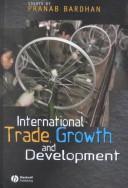
ISBN: 1405101407 1405101415 9781405101417 9781405101400 Year: 2003 Publisher: Oxford Blackwell
Abstract | Keywords | Export | Availability | Bookmark
 Loading...
Loading...Choose an application
- Reference Manager
- EndNote
- RefWorks (Direct export to RefWorks)
International trade --- Economic development --- LDC / Developping Countries - Pays En Développement --- IN / India - Inde --- 338.8 --- 382.10 --- Economische groei. --- Theorieën van internationale en interregionale handel: algemeenheden. Comparatieve voordelen. --- External trade --- Foreign commerce --- Foreign trade --- Global commerce --- Global trade --- Trade, International --- World trade --- Commerce --- International economic relations --- Non-traded goods --- Development, Economic --- Economic growth --- Growth, Economic --- Economic policy --- Economics --- Statics and dynamics (Social sciences) --- Development economics --- Resource curse --- Economische groei --- Theorieën van internationale en interregionale handel: algemeenheden. Comparatieve voordelen
Book
ISBN: 067425984X 9780674259843 Year: 2022 Publisher: Cambridge, Massachusetts : Harvard University Press,
Abstract | Keywords | Export | Availability | Bookmark
 Loading...
Loading...Choose an application
- Reference Manager
- EndNote
- RefWorks (Direct export to RefWorks)
"A development economist with roots in India and the United States offers a short but deep and ambitious account of the corrosive effects of economic and cultural insecurity on liberal democracy in rich and poor countries alike. His diagnosis: the problem is not inequality or capitalism, but snowballing fear of material and cultural loss"--
Democracy --- Security (Psychology) --- Economic security --- Authoritarianism --- Politics and culture --- Fear --- Economic security. --- Authoritarianism. --- Politics and culture. --- Fear. --- Economic aspects.
Book
Year: 1970 Publisher: New York, N.Y. Wiley-Interscience
Abstract | Keywords | Export | Availability | Bookmark
 Loading...
Loading...Choose an application
- Reference Manager
- EndNote
- RefWorks (Direct export to RefWorks)
Book
ISBN: 9781405157162 140515716X Year: 2008 Publisher: Malden, MA ; Oxford Blackwell Pub.
Abstract | Keywords | Export | Availability | Bookmark
 Loading...
Loading...Choose an application
- Reference Manager
- EndNote
- RefWorks (Direct export to RefWorks)
The theme of common environmental resources is explored from the dual perspectives of economics and anthropology, with a focus on developing countries. Contributed readings written by senior scholars in the fields of Economics, Anthropology, and Sociology Looks at the challenges of interdisciplinary work in the social sciences, illustrating the variation in approaches/methodology Focuses on economic security, ecological sustainability, identity formation, and participatory decision-making, particularly in the developing world
Commons --- Natural resources, Communal --- Communication in international relations --- Economic anthropology --- #SBIB:39A4 --- International relations --- Communal natural resources --- Community-owned natural resources --- Collective settlements --- Public lands --- Village communities --- Common lands --- Communal land --- Communal lands --- Land tenure --- Real property --- Marks (Medieval land tenure) --- Toegepaste antropologie --- Law and legislation --- Developing countries --- Economic conditions --- Natural resources, Communal. --- Commons. --- Communication in international relations. --- Economic anthropology. --- Economic conditions. --- Commerce, Primitive --- Economics, Primitive --- Economics --- Ethnology
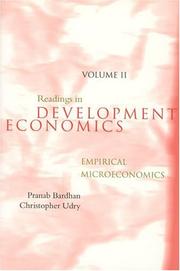
ISBN: 0262267705 142372528X 9780262267700 9780262024853 9781423725282 Year: 2000 Publisher: Cambridge, Mass. MIT Press
Abstract | Keywords | Export | Availability | Bookmark
 Loading...
Loading...Choose an application
- Reference Manager
- EndNote
- RefWorks (Direct export to RefWorks)
These two volumes of readings attempt to bring some degree of structure to a relatively diffuse field. Because of the sheer volume of high-quality work in development economics research, they are intended as a sampling of work at the frontier of the field, rather than as a comprehensive overview. Volume II: Empirical Microeconomics focuses on empirical work. Topics covered include the relationship between wages and health, the role of human capital and demographic change, the internal structure of households, information imperfections in factor markets, the permanent income hypothesis, the possibility of Pareto-efficient allocation of risk in villages, and the relationship between property rights and investment decisions.
Development economics. --- Microeconomics. --- ECONOMICS/Trade & Development --- Price theory --- Economics --- Economic development
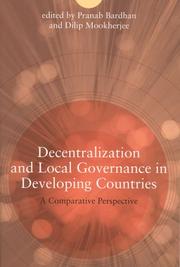
ISBN: 0262267691 9780262267694 0262026007 9780262026000 0262524546 9780262524544 Year: 2006 Publisher: Cambridge, Mass. MIT Press
Abstract | Keywords | Export | Availability | Bookmark
 Loading...
Loading...Choose an application
- Reference Manager
- EndNote
- RefWorks (Direct export to RefWorks)
Over the past three decades the developing world has seen increasing devolution of political and economic power to local governments. Decentralization is considered an important element of participatory democracy and, along with privatization and deregulation, represents a substantial reduction in the authority of national governments over economic policy. The contributors to Decentralization and Local Governance in Developing Countries examine this institutional transformation from comparative and interdisciplinary perspectives, offering detailed case studies of decentralization in eight countries: Bolivia, Brazil, China, India, Indonesia, Pakistan, South Africa, and Uganda.Some of these countries witnessed an unprecedented "big bang" shift toward comprehensive political and economic decentralization: Bolivia in 1995 and Indonesia after the fall of Suharto in 1998. Brazil and India decentralized in an uneven and more gradual manner. In some other countries (such as Pakistan), devolution represented an instrument for consolidation of power of a nondemocratic national government. In China, local governments were granted much economic but little political power. South Africa made the transition from the undemocratic decentralization of apartheid to decentralization under a democratic constitution. The studies provide a comparative perspective on the political and economic context within which decentralization took place, and how this shaped its design and possible impact.ContributorsOmar Azfar, Gianpaolo Baiocchi, Pranab Bardhan, Shubham Chaudhuri, Ali Cheema, Jean-Paul Faguet, Bert Hofman, Kai Kaiser, Philip E. Keefer, Asim Ijaz Khwaja, Justin Yifu Lin, Mingxing Liu, Jeffrey Livingston, Patrick Meagher, Dilip Mookherjee, Ambar Narayan, Adnan Qadir, Ran Tao, Tara Vishwanath, Martin Wittenberg
Decentralization in government --- Local government --- Comparative government. --- Comparative government --- Government - General --- Law, Politics & Government --- Political Institutions & Public Administration - General --- Developing countries --- Politics and government. --- Comparative political systems --- Comparative politics --- Government, Comparative --- Political systems, Comparative --- Local administration --- Township government --- Political science --- Subnational governments --- Administrative and political divisions --- Public administration --- ECONOMICS/Political Economy --- ECONOMICS/Trade & Development
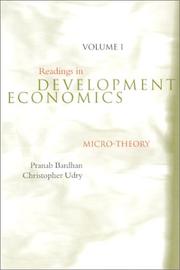
ISBN: 9780262522823 0262522829 0262522837 9780262522830 Year: 2000 Publisher: Cambridge (Mass.) : MIT press,
Abstract | Keywords | Export | Availability | Bookmark
 Loading...
Loading...Choose an application
- Reference Manager
- EndNote
- RefWorks (Direct export to RefWorks)
Development economics --- Microeconomics --- Development economics. --- Microeconomics.
| Listing 1 - 10 of 22 | << page >> |
Sort by
|

 Search
Search Feedback
Feedback About UniCat
About UniCat  Help
Help News
News